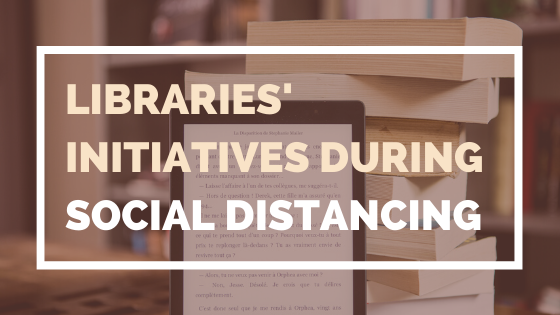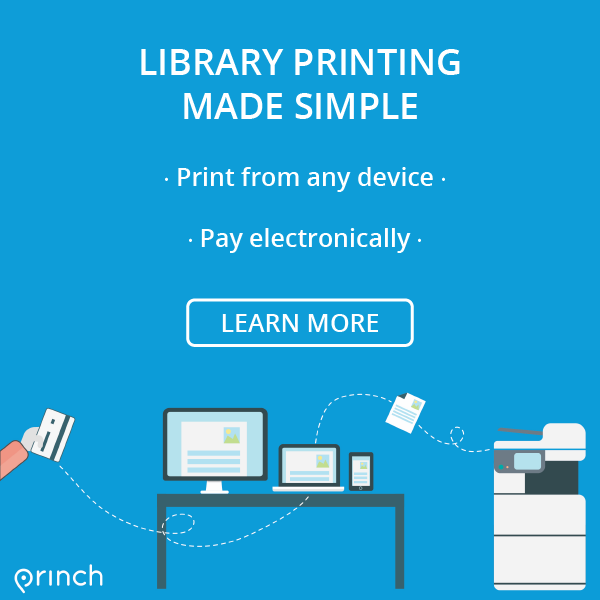The Princh Library blog provides library stories and insights from around the globe. The blog is brought to you by Princh, the only printing solution designed specifically for – and with – libraries! Our user-friendly printing solution makes it easy for library users to print and pay from their own device. Try out our solution risk free for 30 days or watch a short video to understand how we can help your library here! Now let’s get to the blog!
Social Distancing
Everything changed since the World Health Organization (WHO), on March 11, characterized COVID-19 as a pandemic. It feels like suddenly we woke up in a completely different world, where everyone needs to postpone every single plan that has been made for 2020 and the scariest thing is: no one knows for how long.
Unfortunately, social distancing is the best way to slowdown the spread of COVID-19. It is not easy to be isolated and away from family and friends, but maybe there is one good thing in all of this: the deeper appreciation for more face to face interactions. Another positive about the situation is the fact that we are living in the era of technology and there is an online app for everything.
It is recommended that only indispensable services, such as health institutions, supermarkets and transportation, are open to the public. Many people have the opportunity to work from home, others are sent home unsure of their futures.
Public spaces, like libraries, are shutting down. For libraries, it has been difficult to close their doors to the communities they serve, that’s why librarians are making a great effort to keep in touch with their visitors.
Missing our #StoryTime ? Catch up with Sarah on our YouTube channel and watch an online version. https://t.co/6hAppHxwCN #kidsathome #librarieschangelives pic.twitter.com/phGpD9qav4
— City of Melbourne Libraries (@melblibrary) March 26, 2020
Libraries’ Initiatives
Libraries and staff have always been there for the community especially in critical times, but due to the current situation we are all living in, they have taken the decision to close to the public at many libraries around the world.
It is impossible to practice social distancing in libraries, because it is a free public space that welcomes everyone and its facilities act as a gathering place. In times like this, it is important to protect library staff and their community, by supporting their safety and well-being, which is why they are also providing limited access to physical materials.
Libraries are closing their physical spaces, but they are interacting with their community online. Luckily some libraries were already offering online resources on their websites, but the ones who didn’t are trying to find ways of keeping in touch with their visitors through social media and phone calls, for example.
Did you know that Scottish public library services are online – offering access to eBooks, eNewspapers and other resources? In most cases you can access these using your library card. For more details visit your library service website #ScotLibsOnline #Kindness #ScottishLibraries pic.twitter.com/wnZktxyuVd
— SLIC (@SLIC1991) March 26, 2020
As mentioned before, only the indispensable services should be open, which means that a lot of people have been sent home. Some of them can continue to work as usual, but others can’t, which means many people are losing their sources of income. To make life easier, many libraries, like Casey Cardinia Libraries, removed overdue fines and offer automatic renewals. This way they are also preventing people from being outside. All their members have access to Casey Cardinia Libraries App, where they can manage their accounts, and access a digital library that offers 24/7 eBooks, music, magazines and much more.
The internet gives us the opportunity to have everything in “our hands” so easily, but there are some negative points about it like all the incorrect information that exists out there. Wrong information about COVID-19 is everywhere on social media and even on some websites. This is one area where Librarians can offer a huge amount of support, by filtering the useful and accurate information from the rest. In order to help people find the right material, Princeton Public Library created a website, as a single source of reliable information for their community about coronavirus. On top of that, their library members can access a variety of eBooks, audiobooks, digital magazines, music and television. If a student needs some help with homework, test prep or just wants to build new skills they can also utilize Brainfuse.
“Google can bring you back 100,000 answers. A librarian can bring you back the right one”
Princeton Public Library, also created a spreadsheet of their most regular visitors in order to give them a call and have a chat, so they don’t feel so alone at home. Many of these regulars are elderly people who live on their own and really appreciate the effort their library is making. For more examples of how libraries are trying to combat loneliness in their communities check out one of our previous posts.
Since schools are also closed, Indianapolis Public Library is offering free ways for parents to keep children entertained and educated while they are at home. All members have access to different online resources like Kanopy, which offers educational video-streaming and Storytime; and Hoopla, where they can download eBooks, videos, and music. They also allow a visit to The Children’s Museum and Eskenazi Museum of Art from home. Since the physical buildings are closed, they can access the sites via virtual tours which are supplemented by educational activities.
JKF Library is more active on social media, they try to engage people through their frequent posts to find out what the majority of their followers would like to see during this period of isolation.
We have another live session for you on https://t.co/ZJ1syfVnsy!
Today @rdlankes will be talking to Jason Broughton about #library resources & #emergencymanagement.
🕑: 14:00 CET (9:00 EST)https://t.co/zImJpxetDK pic.twitter.com/hOTgSM8QNB
— Public Libraries 2030 (@LibrariesEU) March 26, 2020
Looking inwards, Massachusetts Library System, is putting on a couple of webinars, on March 25 and 26, to inform other librarians about how to prepare and respond to the coronavirus crisis. By learning about these specific actions and topics, they can update their websites to keep members reliably informed about prevention, testing, travel information, guidance and recommendations.
Florida Atlantic University Libraries are very aware that, for some of their students, it would be impossible to access online lessons without a laptop, for that reason, they have made a limited amount available for those in need to borrow.
Libraries will always be the place to go in critical times
Everyone is still trying to figure out the best way to make social distancing less boring and librarians around the world are doing an excellent job at keeping people occupied with some truly amazing online resources. It is likely that some members didn’t know about everything their library has to offer and now that they do, they can use it all the time at home, even after the crisis is over.
The website and social media pages of libraries around the world are a dependable source of information and library staff are still working hard to keep their community up-to-date with data they can trust, learn from and share. Only the physical buildings are closed, but there are still librarians available, ready to help you online or through a call.
Stay home, protect yourself and the people around you!

Micaela is a content writer for the Princh Library Blog. Princh, which is a printing solution designed specifically for and with public libraries, makes a consistent effort to provide advocacy for libraries and library professionals. The Princh blog discusses library specific topics that inform their readers of library trends, insights, technologies and more.
Recent posts
Green Libraries: How Sustainable Design is Shaping the Future of Public Libraries
In this week's Princh Library Blog post, recurring guest writer Sam L. Bowman discusses an ever so important topic: sustainable design and [...]
Librarians Supporting Digital Literacy in the Community
In this week's Princh Library Blog, Nina Grant covers why digital literacy is important, the variety of ways in which librarians are supporting [...]





Leave A Comment